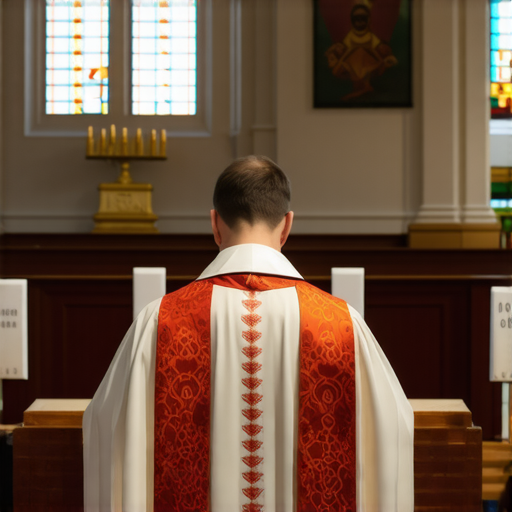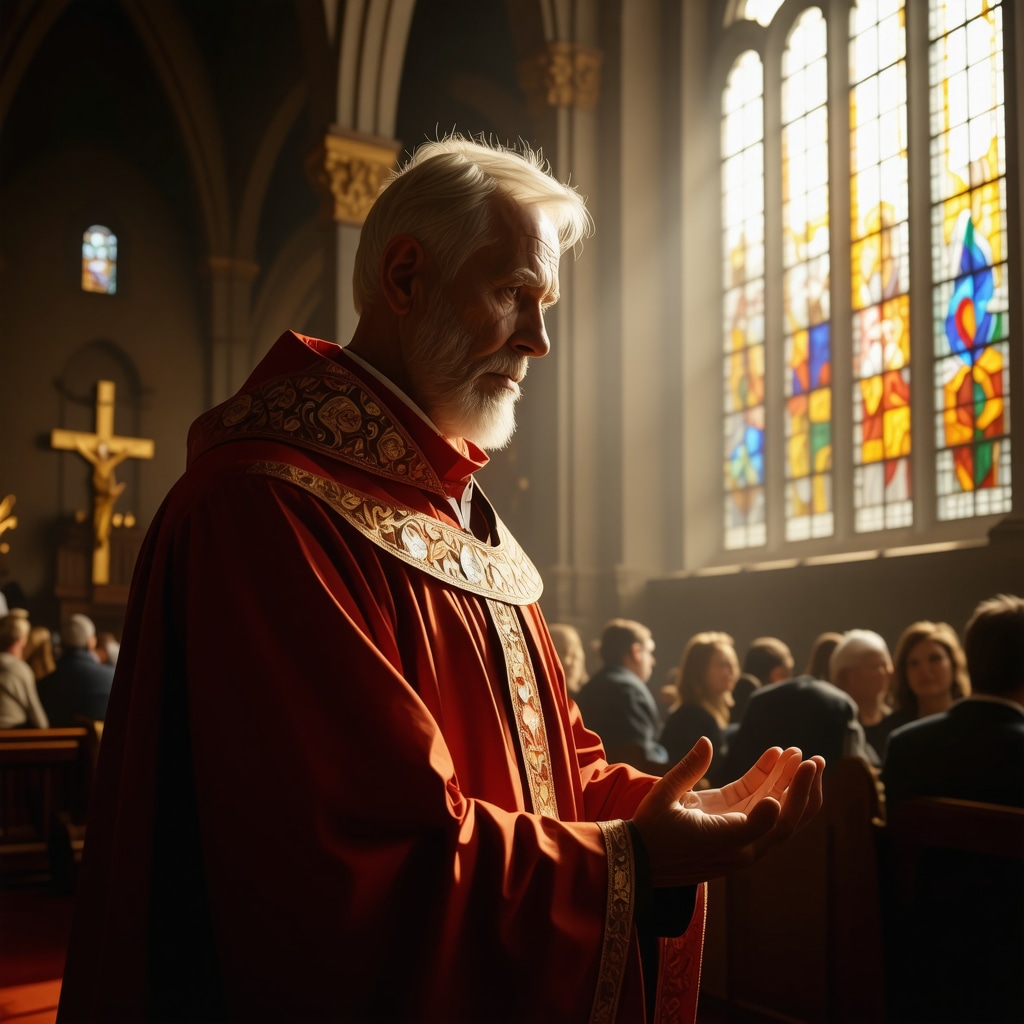My Unexpected Encounter with the Archdiocese of Washington’s Exorcist Ministry
It all started when I faced a series of unexplained events that shook my faith and challenged my understanding of spiritual warfare. One evening, I noticed a strange presence in my home — shadows lurking where there shouldn’t be, and an overwhelming sense of fear that no earthly remedy could dispel. Desperate for guidance, I turned to the Catholic Exorcist Archdiocese Washington, a trusted path to healing that I had heard about through trusted community sources.
What Makes the Archdiocese’s Approach to Exorcism Stand Out?
What struck me about the Archdiocese of Washington’s exorcist ministry was their profound sense of compassion intertwined with unwavering professionalism. Their approach isn’t about sensationalism but about genuine spiritual healing. I learned that their process involves thorough discernment, prayer, and adherence to the Church’s sacred rites, ensuring each case is treated with the utmost respect and care. As I delved deeper, I discovered that the archdiocese’s team is composed of highly trained priests who specialize in spiritual deliverance, combining their expertise with a deep understanding of the spiritual battles many face today.
How Can the Archdiocese Help Those in Need?
If you’re like me, questioning whether your struggles are purely psychological or something more spiritual, I recommend exploring the resources offered by the Archdiocese of Washington. Their dedicated priests can provide guidance, prayers, and, if necessary, deliverance rites rooted in authentic Catholic tradition. It’s reassuring to know that through their trusted services, many have found renewed hope and healing from unseen spiritual afflictions.
Is It Safe to Seek Help from an Exorcist in Today’s World?
That’s a question I often asked myself during my journey. The truth is, the Church’s exorcists are highly trained to handle cases with discernment and care, always prioritizing the well-being of those seeking help. Their work is grounded in faith, prayer, and a deep commitment to divine authority, as emphasized by sources like the Vatican’s official stance on exorcism. If you’re considering reaching out, remember that it’s about trusting a process that aims to bring spiritual peace and healing.
If you’ve had any experience with the Catholic Exorcist Archdiocese Washington or have questions about spiritual deliverance, I invite you to share your story below. Your insights might help someone else find the courage to seek the help they need.
The Role of Spiritual Discernment in Modern Exorcisms
In my ongoing exploration of spiritual warfare, I’ve learned that discernment is fundamental. It’s not just about identifying signs of possession or oppression but about understanding the nuanced distinction between psychological struggles and genuine spiritual affliction. The Catholic Church emphasizes that exorcisms should only be conducted when there is clear evidence of spiritual influence, which requires a trained and spiritually discerning priest. This process often involves detailed interviews, prayer, and sometimes psychological evaluation to ensure that the case is appropriate for spiritual intervention.
What Are the Risks of Misdiagnosing Spiritual or Psychological Issues?
Misdiagnosis can lead to unnecessary suffering or even spiritual harm if one bypasses proper discernment. For example, attributing mental health issues solely to supernatural causes might delay effective psychological treatment. Conversely, dismissing genuine spiritual distress as mere psychological trouble could prevent someone from receiving necessary divine healing. That’s why the collaboration between mental health professionals and trained exorcists is crucial. The Church advocates for a holistic approach—respecting both spiritual and medical perspectives—to ensure the well-being of the individual.
The Practical Steps for Engaging in Spiritual Warfare
For those seeking to protect themselves and their loved ones, understanding the practical application of spiritual defenses is essential. Regular prayer, sacramental participation, and reading Scripture serve as foundational armor against spiritual attacks. Additionally, consulting with trusted clergy or spiritual directors can provide personalized guidance tailored to specific circumstances. The Church’s teachings suggest that consistent spiritual discipline acts as a shield, preventing the escalation of negative spiritual influences.
How Can We Foster a Spiritually Resilient Community?
Building resilience isn’t just an individual effort but a communal one. Churches and faith communities play a vital role by offering education on spiritual warfare, prayer groups, and support networks. These collective efforts create an environment where spiritual vulnerabilities are addressed openly, and members are equipped with the tools to stand firm against evil. According to recent research by the Vatican, fostering community resilience is integral to spiritual health and protection.
If you’re interested in deepening your understanding of spiritual warfare, I recommend exploring resources from reputable Catholic publications and engaging with trusted clergy. Sharing your experiences and questions can also create a supportive environment where faith and knowledge grow side by side. Have you encountered situations where spiritual discernment made a difference? Your stories could inspire others to approach their struggles with faith and prudence.
What Are the Hidden Layers of Spiritual Warfare in Modern Exorcisms?
Reflecting on my journey, I’ve come to realize that spiritual warfare isn’t merely about confronting external evil but also about understanding the internal battles we face—doubts, fears, and unresolved traumas often intertwined with spiritual oppression. The Catholic Church’s approach, especially within the Washington archdiocese, emphasizes discernment not just as a procedural step but as a profound act of spiritual listening. This listening involves tuning into subtle spiritual cues that might often be overlooked—like persistent feelings of despair or unexplained physical symptoms—signs that could be indicative of deeper spiritual struggles.
In my experience, the complexity arises when these signs mimic psychological issues. The fine line between mental health and spiritual influence requires a trained eye and a compassionate heart. I’ve learned that the most effective exorcisms—when truly necessary—are those conducted with humility, patience, and a recognition of the person’s full humanity. As the Vatican’s guidelines underline, a collaborative approach involving mental health professionals and spiritual directors often provides the most holistic care, ensuring no aspect of a person’s well-being is neglected.
Does Genuine Deliverance Require More Than Rituals? A Personal Reflection
One question that lingered in my mind was whether exorcism is merely a ritual or a pathway to genuine transformation. From my reading and conversations with clergy, I’ve understood that the ritual itself is a sacred act—an invocation of divine authority to cast out darkness. Yet, true deliverance transcends the rite; it involves ongoing spiritual renewal, deep repentance, and trust in God’s power to heal. The exorcist’s role is like that of a seasoned guide, leading the individual through a process of inner conversion that lasts beyond the formal rites.
This realization shifted my perspective: spiritual healing is a continuous journey. It’s about cultivating resilience through prayer, sacraments, and community support. The Church teaches us that spiritual warfare is fought daily—through consistent discipline and surrender to divine grace. Engaging in this ongoing battle with faith and humility can open doors to profound inner peace, often more powerful than any external exorcism could provide. If you’re curious about practical steps to deepen your spiritual resilience, exploring resources like the Archdiocese of Washington can be a meaningful starting point.
How Can We Cultivate a Spiritually Resilient Heart in a Challenging World?
Building resilience isn’t just about individual effort; it’s about nurturing a community rooted in faith and mutual support. My own experiences have shown me that being part of prayer groups, engaging in regular sacraments, and sharing testimonies create a collective shield against spiritual attacks. These communal acts reinforce our spiritual defenses and remind us that we’re never alone in our struggles.
Moreover, fostering an environment of openness—where questions about spiritual warfare and mental health are welcomed—encourages growth and understanding. As the Vatican emphasizes, a resilient spiritual community is vital for collective protection and healing. Encouraging dialogue, offering spiritual mentorship, and promoting education about spiritual warfare can empower members to confront their challenges with confidence and hope.
If you’ve experienced moments where prayer and community made a difference during your spiritual battles, I invite you to share your story. Your insights could inspire others to embrace their faith more fully and approach spiritual challenges with wisdom and courage.
What Are the Next Steps in My Personal Journey Toward Spiritual Maturity?
My journey continues as I seek deeper understanding and greater trust in divine guidance. Engaging with trusted clergy, studying church teachings, and practicing daily spiritual disciplines help me stay grounded. Remember, spiritual resilience is a lifelong pursuit—one that requires patience, humility, and a willingness to learn from each experience.
If you are interested in exploring more about spiritual protection and healing, I recommend visiting the Archdiocese of Washington’s resources or connecting with a trusted spiritual director. Sharing your questions and stories can also foster a supportive environment where faith and understanding flourish. Have you encountered situations where perseverance and prayer turned the tide in your spiritual battles? Your journey might just be the encouragement someone else needs to keep going.

Unveiling the Hidden Layers of Spiritual Warfare in Contemporary Exorcisms
As I continued my journey into the intricate realm of spiritual warfare, I discovered that genuine exorcisms often involve more than the visible confrontation with evil spirits; they reveal the profound internal struggles that many face—doubts, unresolved traumas, and emotional wounds that subtly influence our spiritual health. The Catholic Church’s approach, especially within the Washington archdiocese, emphasizes the importance of discernment—not merely as a procedural step but as a sensitive act of listening and understanding the person’s spiritual and emotional state. This process entails a meticulous assessment, combining prayerful intuition with psychological evaluation, to differentiate between mental health issues and authentic spiritual affliction.
How Do Advanced Exorcists Navigate Complex Cases Where Psychological and Spiritual Factors Intersect?
Dealing with cases at the intersection of psychology and spirituality demands exceptional discernment. Experienced exorcists collaborate closely with mental health professionals, recognizing that some symptoms may mimic spiritual oppression while originating from psychological origins. According to authoritative sources like the Vatican, the integration of spiritual and medical assessments ensures a holistic approach, safeguarding the dignity and well-being of the individual. This partnership underscores that spiritual deliverance is most effective when it complements, rather than replaces, medical treatment—forming a comprehensive strategy for healing.
In my own explorations, I have learned that cultivating a nuanced understanding of these complex cases fosters greater empathy and patience. It also underscores the necessity for trained professionals who can discern subtle spiritual cues—such as persistent despair, physical sensations, or unexplainable fears—that may point toward deeper spiritual conflicts. Recognizing these signals invites a more compassionate, tailored response, enhancing the efficacy of the intervention and honoring the person’s full humanity.
What Role Does Personal and Community Resilience Play in Long-Term Spiritual Healing?
Building resilience is not merely an individual endeavor but a communal effort rooted in faith, prayer, and shared testimony. My experiences have shown that active participation in prayer groups, regular reception of the sacraments, and ongoing spiritual mentorship create a fortified environment where spiritual vulnerabilities are addressed proactively. These collective practices act as a shield, providing strength against future spiritual assaults and fostering a resilient community that upholds each member’s spiritual journey.
Research from the Vatican highlights that resilient faith communities are essential for spiritual protection, especially in an increasingly complex world where spiritual and psychological challenges often intertwine. Encouraging open dialogue about spiritual warfare and mental health, and creating safe spaces for testimonies and questions, empowers individuals to confront their battles with confidence and hope. These communal efforts amplify individual resilience, enabling believers to stand firm amidst adversity.
If you’re eager to deepen your understanding of spiritual resilience and explore practical tools for ongoing inner healing, I invite you to engage with the resources provided by the Archdiocese of Washington. Sharing your insights or personal experiences can foster a supportive environment where faith and knowledge flourish, inspiring others to persevere and grow stronger in their spiritual walk.
Things I Wish I Knew Earlier (or You Might Find Surprising)
Spiritual warfare is more nuanced than I thought
Initially, I believed that exorcisms were straightforward battles between good and evil. However, my journey revealed how complex and layered spiritual warfare truly is, often involving internal struggles like doubts, fears, and unresolved traumas that subtly influence our spiritual health. Recognizing these nuances has helped me approach spiritual battles with more patience and humility.
The importance of discernment cannot be overstated
One thing I wish I understood earlier is how crucial spiritual discernment is before seeking exorcism. The Church emphasizes that genuine cases involve clear signs of spiritual influence, and proper discernment often requires collaboration between trained priests and mental health professionals. Jumping to conclusions without this can cause unnecessary suffering or spiritual harm.
Exorcisms are not just rituals; they are spiritual journeys
While rituals are vital, I discovered that true deliverance involves ongoing inner transformation, deep repentance, and trust in divine power. Exorcists serve as guides, but the real healing happens within the individual’s heart and mind over time, through prayer and community support.
Community resilience plays a vital role in spiritual protection
Building a resilient spiritual community through prayer groups, sacraments, and shared testimonies creates a collective shield against evil. My experience shows that a supportive faith environment empowers individuals to confront and overcome spiritual challenges more effectively.
Misdiagnosis can hinder genuine healing
Misinterpreting mental health issues as spiritual problems—or vice versa—can delay effective treatment. A holistic approach that respects both medical and spiritual perspectives ensures that individuals receive the care they need without unnecessary suffering. Collaboration is key.
Resources I’ve Come to Trust Over Time
Vatican News
This official source offers authoritative insights directly from the Vatican, helping me understand the Church’s stance on exorcism and spiritual warfare. It’s a reliable starting point for anyone interested in authentic Catholic teachings.
The Catholic Exorcist Archdiocese Washington Website
Their detailed resources, prayers, and guidance helped me grasp the importance of proper discernment and the role of trained priests in spiritual deliverance. I highly recommend exploring their offerings for a grounded perspective.
Books by Dr. Malachi Martin
His writings provided me with a deeper understanding of the spiritual battles faced today, blending theology with real-world applications. If you’re curious about the spiritual realm, his works are enlightening.
Vatican’s Official Guidelines on Exorcism
These guidelines clarified the procedural and theological standards for exorcisms, emphasizing the importance of discernment and compassion. It’s essential reading for anyone considering this path.
Parting Thoughts from My Perspective
Exploring the depths of spiritual warfare and the role of exorcism has profoundly transformed my understanding of faith and healing. I’ve learned that genuine deliverance is a holistic process—one that involves prayer, discernment, community, and ongoing inner work. If you’re navigating similar struggles, remember that you’re not alone, and trusting in divine guidance can lead to profound peace. I encourage you to seek knowledge, foster community resilience, and approach spiritual challenges with humility and faith. If this resonated with you, I’d love to hear your thoughts or experiences. Sharing stories can inspire others on their spiritual journeys and remind us all of the power of divine grace.


Reading about this ministry’s compassionate and professional approach really resonated with me. I’ve seen how crucial proper discernment is in spiritual matters, especially when it comes to distinguishing between psychological and spiritual struggles. My own experience with mental health issues made me appreciate how interconnected spiritual and medical evaluations need to be, as you mentioned. I wonder, how do trained exorcists balance the urgency of cases with the meticulous process of discernment without causing additional distress? It’s reassuring to know that ongoing collaboration with mental health professionals is vital and that the Church emphasizes respect and care in these sensitive situations. I believe fostering community resilience through prayer and support groups plays a significant role in long-term healing too. Has anyone found that integrating regular prayer with professional guidance made a tangible difference in their spiritual journey? Your insights could really help others deepen their understanding of spiritual resilience and healing.
What really stood out to me in this discussion of the Washington exorcist ministry is the delicate balance they maintain between spiritual discernment and compassionate care. It’s encouraging to see an emphasis on thorough assessments—combining prayer, interviews, and even psychological evaluation—to ensure that each case is approached with respect and humility. I’ve always believed that spiritual warfare is deeply personal and complex, involving internal struggles that are not always visible on the surface. Personally, I’ve found that ongoing prayer, community support, and trusting trained clergy have helped me navigate my own faith journey through difficult times.
That said, I wonder how others have experienced integrating faith-based interventions with medical or psychological treatments. Have you noticed that a combined approach offers more stability and peace? It seems that fostering community resilience—through prayer groups or spiritual mentorship—could be crucial in supporting long-term healing and protecting against future spiritual attacks. I’d love to hear more about practical steps that have worked for others in sustaining their spiritual resilience while facing personal challenges.